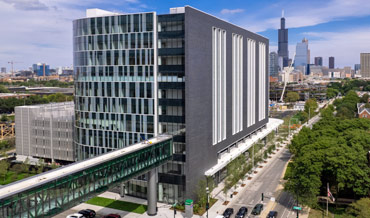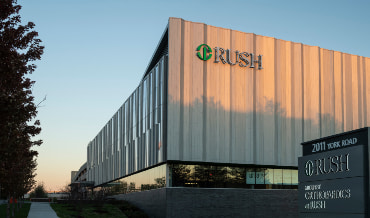Interventional endoscopy includes advanced, minimally invasive procedures in which a doctor inserts a small tube with a camera through your mouth or elsewhere. This allows the doctor to diagnose and treat many conditions of the digestive tract, pancreas and bile ducts with less pain and a faster recovery, compared with surgery.
Who Would Benefit from Interventional Endoscopy?
You may benefit from seeing our interventional endoscopy team if your doctor thinks you have one of the following conditions:
- Achalasia
- Ampullary adenomas, polyps or tumors
- Autoimmune diseases of the bile duct and pancreas
- Barrett's esophagus
- Bile duct cancer
- Bile duct stones, leaks and other diseases/strictures
- Colorectal cancer
- Complex colon polyps
- Complications of bariatric surgery and revision of prior bariatric surgery
- Esophageal cancer
- Fistula
- Gallbladder cancer
- Gastroesophageal reflux disease (GERD)/heartburn
- Gastrointestinal stromal tumors
- Pancreatic cancer
- Pancreatic cysts
- Pancreatitis (acute and chronic) and its complications
- Primary sclerosing cholangitis
- Small bowel disease
- Stomach cancer
- Zenker's diverticulum
For example, if you have an early-stage GI cancer, a Rush endoscopist can often remove it without making any incisions. Or if you have hemorrhoids, an endoscopist may be able to repair them without surgery.
What Procedures Are Available?
Interventional endoscopy includes a wide range of procedures that can be used to diagnose and treat gastrointestinal conditions. These include the following:
- Balloon-assisted enteroscopy, a procedure that helps your doctor to see further into the lower intestine than was previously possible, enhancing the ability to diagnose and/or treat certain conditions. It may be a good option if you issues in your small intestine like bleeding, small strictures, abnormal tissues, polyps or tumors.
- Capsule endoscopy (PillCam), which involves swallowing a pill-sized camera that takes pictures of your digestive tract to diagnose and monitor celiac disease, Crohn's disease and other conditions
- Colonoscopy, which can detect changes in your colon and rectum, including precancerous and cancerous growths
- Endoscopic mucosal resection (EMR), which is used to remove early-stage cancers or precancerous tumors if you have Barrett's esophagus, esophageal cancer, stomach cancer and other conditions
- Endoscopic retrograde cholangiopancreatography (ERCP), which uses X-rays and an endoscope to diagnose and treat diseases of your liver, gallbladder, bile ducts and pancreas
- Endoscopic ultrasound, which doctors use to examine your digestive tract and other areas
- Esophagoscopy, which your doctor may recommend to check your esophagus for signs of esophageal cancer
- Upper endoscopy (also known as a esophagogastroduodenoscopy), which your doctor may recommend if you have heartburn, gastrointestinal bleeding, swallowing problems, nausea or other symptoms
Rush Excellence in Interventional Endoscopy
- Convenient access to care: We know that waiting for treatment can be stressful, especially if you have a suspected cancer or other gastrointestinal condition that requires urgent care. That's why we make it a priority to see you as quickly as possible — usually within one or two days for more urgent conditions and within three to five days for other types of visits. We also offer Saturday appointments at some locations.
- A team-approach to diagnosis and treatment: Many gastrointestinal conditions require care from several experts for the best results. When you come to Rush, our endoscopists work on your care team alongside experts in cancer care, weight management, liver transplant and other areas to help you achieve the best quality of life possible.
- Nationally recognized GI and cancer care programs: At Rush, you will be cared for by some of the nation's leading experts in cancer and digestive health. U.S. News & World Report ranked Rush University Medical Center as among the best in the nation for gastroenterology and GI surgery, as well as cancer. The hospital also earned high performing status for colon cancer surgery.




